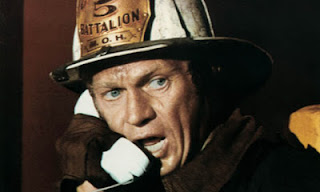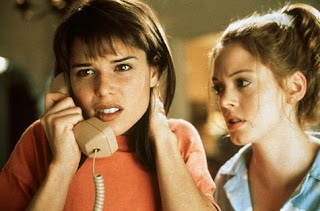The Towering Inferno
“Now, you know there's no sure way for us to fight a fire in anything over the seventh floor, but you guys just keep building 'em as high as you can.”
When I worked at a big box retail store some fifteen years ago I met songwriter Joel Hirschhorn who composed the Oscar-winning song “We May Never Love Like This Again” from The Towering Inferno. We struck up a brief friendship, and he recommended that I take the time and watch this film along with The Poseidon Adventure (featuring his other Oscar-winning song). He told me, “they don’t make them like this anymore,” and boy was he right!
Afraid of riding an elevator because it might get stuck doesn't even compare to the anxiety this film generates with being trapped on 97th floor with both stairwells either destroyed, blocked, or engulfed in flames, the sprinkler system aren't working, and what you perceive to be your only option is to jump to your death through a plate glass window, just doesn't seem like an option you want to choose.
The Towering Inferno represents the epitome of 1970s disaster movies; it practically towers above the rest (sorry, I couldn't resist). Most of these disaster-type films, including this one, relied heavily on multiple story-lines (creating a massive star-studded cast, attracting a broader audience) and ground-breaking visual effects. While almost forty years old, Inferno still holds up rather well - I give that credit to the performances, direction, and the utter realistic terror that a skyscraper fire can still convey to this day.
I love how textbook cliché the fire starts. It reminds me of every generic safety videos I ever watched as an employee. You know the one - where a pile of rags is left amongst canisters of flammable material? In The Towering Inferno, an electrical short causes the breaker box to burst open, exposing live wires to the rags in a storage room on the 81st floor. The fire goes undetected due to malfunctioning fire alarms and faulty sprinkler systems. Death, destruction, and mayhem ensues.
What I find most enjoyable about The Towering Inferno is the honesty it conveys. I’m not particularly a fan of death, but I do find it refreshing that some of the characters portrayed in this film actually die. More current movies sometimes seem to stray away from killing off major or even minor characters, whether it’s a fear to preserve viewership favoritism or the desire for a potential sequel. Either way, I’m not sure but back in the 1970s they liked to pull the rug out from underneath your feet.
If you’re looking for a who’s who of Hollywood stardom of the mid-1970s, Towering Inferno is a one-stop shop: Building architect Doug Roberts (Paul Newman), Battalion Chief O’Hallorhan (Steve McQueen), building owner James Duncan (William Holden), his son-in-law and electrical engineer Roger Simmons (Richard Chamberlain), public relations chief Dan Bigelow (Robert Wagner), Robert’s girlfriend Susan (Faye Dunaway), security chief Harry Jernigan (OJ Simpson), and aging con-man Harlee Claiborne (Fred Astaire), among many others.
It amazes me the blind faith we put in man and his structures. So much so, that it sometimes boggles the mind. If you're willing to put your blind faith in my recommendation, and you’re in the mood for what the foolish can bring upon man when he cuts corners, and for the triumph of heroic human nature, then I would look no further than The Towering Inferno.
Film Geek Footnotes:
- Relying heaving upon the inspiration of recent structural creations such as, the Sears Tower, and the World Trade Center Twin Towers (both finishing construction in 1973), the common question usually asked was what might happen if a fire broke out?
- Paul Newman's and Steve McQueen's names are staggered in the opening credits, closing credits, and on the posters so that, depending on which way you read it (top to bottom or left to right), both appear to get top billing. This is known as "diagonal billing."



Comments
Post a Comment